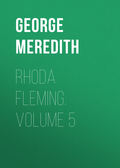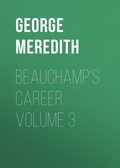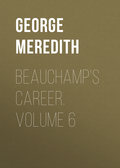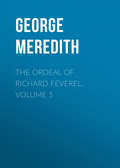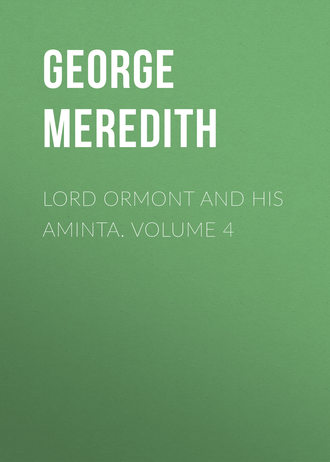
George Meredith
Lord Ormont and His Aminta. Volume 4
'I suspect you've more than your match in young Weyburn, Mr. Morsfield,' Lady Charlotte said, measuring them as they stood together. They turned at last.
'You shall drive back to town with me, Rowsley,' said the fighting dame.
She breathed no hint of her triumph.
CHAPTER XVIII
A SCENE ON THE ROAD BACK
After refusing to quit the grounds of Steignton, in spite of the proprietor, Mrs. Pagnell burst into an agitation to have them be at speed, that they might 'shake the dust of the place from the soles of their feet'; and she hurried past Aminta and Lord Ormont's insolent emissary, carrying Mr. Morsfield beside her, perforce of a series of imperiously-toned vacuous questions, to which he listened in rigid politeness, with the ejaculation steaming off from time to time, 'A scandal!'
He shot glances behind him.
Mrs. Pagnell was going too fast. She, however, world not hear of a halt, and she was his main apology for being present; he was excruciatingly attached to the horrid woman.
Weyburn spoke the commonplaces about regrets to Aminta.
'Believe me, it's long since I have been so happy,' she said.
She had come out of her stupefaction, and she wore no theatrical looks of cheerfulness.
'I regret that you should be dragged away. But, if you say you do not mind, it will be pleasant to me. I can excuse Lord Ormont's anger. I was ignorant of his presence here. I thought him in Paris. I supposed the place empty. I wished to see it once. I travelled as the niece of Mrs. Pagnell. She is a little infatuated. . . . Mr. Morsfield heard of our expedition through her. I changed the route. I was not in want of a defender. I could have defended myself in case of need. We slept at Ashead, two hours from Steignton. He and a friend accompanied us, not with my consent. Lord Ormont could not have been aware of that. These accidental circumstances happen. There may be pardonable intentions on all sides.'
She smiled. Her looks were open, and her voice light and spirited; though the natural dark rose-glow was absent from her olive cheeks.
Weyburn puzzled over the mystery of so volatile a treatment of a serious matter, on the part of a woman whose feelings he had reason to know were quick and deep. She might be acting, as women so cleverly do.
It could hardly be acting when she pointed to peeps of scenery, with a just eye for landscape.
'You leave us for Switzerland very soon?' she said.
'The Reversion I have been expecting has fallen in, besides my inheritance. My mother was not to see the school. But I shall not forget her counsels. I can now make my purchase of the house and buildings, and buy out my partner at the end of a year. My boys are jumping to start. I had last week a letter from Emile.'
'Dear little Emile!'
'You like him?'
'I could use a warmer word. He knew me when I was a girl.'
She wound the strings of his heart suddenly tense, and they sang to their quivering.
'You will let me hear of you, Mr. Weyburn?'
'I will write. Oh! certainly I will write, if I am told you are interested in our doings, Lady Ormont.'
'I will let you know that I am.'
'I shall be happy in writing full reports.'
'Every detail, I beg. All concerning the school. Help me to feel I am a boarder. I catch up an old sympathy I had for girls and boys. For boys! any boys! the dear monkey boys! cherub monkeys! They are so funny. I am sure I never have laughed as I did at Selina Collett's report, through her brother, of the way the boys tried to take to my name; and their sneezing at it, like a cat at a deceitful dish. "Aminta"—was that their way?'
'Something—the young rascals!'
'But please repeat it as you heard them.'
'" Aminta."'
He subdued the mouthing.
'It didn't, offend me at all. It is one of my amusements to think of it.
But after a time they liked the name; and then how did they say it?'
He had the beloved Aminta on his lips.
He checked it, or the power to speak it failed. She drew in a sharp breath.
'I hope your boys will have plenty of fun in them. They will have you for a providence and a friend. I should wish to propose to visit your school some day. You will keep me informed whether the school has vacancies. You will, please, keep me regularly informed?'
She broke into sobs.
Weyburn talked on of the school, for a cover to the resuming of her fallen mask, as he fancied it.
She soon recovered, all save a steady voice for converse, and begged him to proceed, and spoke in the flow of the subject; but the quaver of her tones was a cause of further melting. The tears poured, she could not explain why, beyond assuring him that they were no sign of unhappiness. Winds on the great waters against a strong tidal current beat up the wave and shear and wing the spray, as in Aminta's bosom. Only she could know that it was not her heart weeping, though she had grounds for a woman's weeping. But she alone could be aware of her heart's running counter to the tears.
Her agitation was untimely. Both Mrs. Pagnell and Mr. Morsfield observed emotion at work. And who could wonder? A wife denied the admittance to her husband's house by her husband! The most beautiful woman of her time relentlessly humiliated, ordered to journey back the way she had come.
They had reached the gate of the park, and had turned.
'A scandal!'
Mr. Morsfield renewed his interjection vehemently, for an apology to his politeness in breaking from Mrs. Pagnell.
Joining the lady, whose tears were of the nerves, he made offer of his devotion in any shape; and she was again in the plight to which a desperado can push a woman of the gentle kind. She had the fear of provoking a collision if she reminded him, that despite her entreaties, he had compelled her, seconded by her aunt as he had been, to submit to his absurd protection on the walk across the park.
He seemed quite regardless of the mischief he had created; and, reflecting upon how it served his purpose, he might well be. Intemperate lover, of the ancient pattern, that he was, his aim to win the woman acknowledged no obstacle in the means. Her pitiable position appealed to the best of him; his inordinate desire of her aroused the worst. It was, besides, an element of his coxcombry, that he should, in apeing the utterly inconsiderate, rush swiftly to impersonate it when his passions were cast on a die.
Weyburn he ignored as a stranger, an intruder, an inferior.
Aminta's chariot was at the gate.
She had to resign herself to the chances of a clash of men, and, as there were two to one, she requested help of Weyburn's hand, that he might be near her.
A mounted gentleman, smelling parasite in his bearing, held the bridle of
Morsfield's horse.
The ladies having entered the chariot, Morsfield sprang to the saddle, and said: 'You, sir, had better stretch your legs to the inn.'
'There is room for you, Mr. Weyburn,' said Aminta.
Mrs. Pagnell puffed.
'I can't think we've room, my dear. I want that bit of seat in front for my feet.'
Morsfield kicked at his horse's flanks, and between Weyburn and the chariot step, cried: 'Back, sir!'
His reins were seized; the horse reared, the unexpected occurred.
Weyburn shouted 'Off!' to the postillion, and jumped in.
Morsfield was left to the shaking of a dusty coat, while the chariot rolled its gentle course down the leafy lane into the high-road.
His friend had seized the horse's bridle-reins; and he remarked: 'I say,
Dolf, we don't prosper to-day.'
'He pays for it!' said Morsfield, foot in stirrup. 'You'll take him and trounce him at the inn. I don't fight with servants. Better game. One thing, Cumnock: the fellow's clever at the foils.'
'Foils to the devil! If I tackle the fellow, it won't be with the buttons. But how has he pushed in?'
Morsfield reported 'the scandal!' in sharp headings.
'Turned her away. Won't have her enter his house—grandest woman in all England! Sent his dog to guard. Think of it for an insult! It's insult upon insult. I 've done my utmost to fire his marrow. I did myself a good turn by following her up and entering that park with her. I shall succeed; there 's a look of it. All I have—my life—is that woman's. I never knew what this devil's torture was before I saw her.'
His friend was concerned for his veracity. 'Amy!'
'A common spotted snake. She caught me young, and she didn't carry me off, as I mean to carry off this glory of her sex—she is: you've seen her!—and free her, and devote every minute of the rest of my days to her. I say I must win the woman if I stop at nothing, or I perish; and if it 's a failure, exit 's my road. I 've watched every atom she touched in a room, and would have heaped gold to have the chairs, tables, cups, carpets, mine. I have two short letters written with her hand. I 'd give two of my estates for two more. If I were a beggar, and kept them, I should be rich. Relieve me of that dog, and I toss you a thousand-pound note, and thank you from my soul, Cumnock. You know what hangs on it. Spur, you dolt, or she'll be out of sight.'
They cantered upon application of the spur. Captain Cumnock was an impecunious fearless rascal, therefore a parasite and a bully duellist; a thick-built north-countryman; a burly ape of the ultra-elegant; hunter, gamester, hard-drinker, man of pleasure. His known readiness to fight was his trump-card at a period when the declining custom of the duel taxed men's courage to brave the law and the Puritan in the interests of a privileged and menaced aristocracy. An incident like the present was the passion in the dice-box to Cumnock. Morsfield was of the order of men who can be generous up to the pitch of their desires. Consequently, the world accounted him open-handed and devoted when enamoured. Few men liked him; he was a hero with some women. The women he trampled on; the men he despised. To the lady of his choice he sincerely offered his fortune and his life for the enjoyment of her favour. His ostentation and his offensive daring combined the characteristics of the peacock and the hawk. Always near upon madness, there were occasions when he could eclipse the insane. He had a ringing renown in his class.
Chariot and horsemen arrived at the Roebuck Arms, at the centre of the small town of Ashead, on the line from Steignton through Rowsley. The pair of cavaliers dismounted and hustled Weyburn in assisting the ladies to descend.
The ladies entered the inn; they declined refection of any sort. They had biscuits and sweetmeats, and looked forward to tea at a farther stage. Captain Cumnock stooped to their verdict on themselves, with marvel at the quantity of flesh they managed to put on their bones from such dieting.
'By your courtesy, sir, a word with you in the inn yard, if you please,' he said to Weyburn in the inn-porch.
Weyburn answered, 'Half a minute,' and was informed that it was exactly the amount of time the captain could afford to wait.
Weyburn had seen the Steignton phaeton and coachman in the earl's light- blue livery. It was at his orders, he heard. He told the coachman to expect hire shortly, and he followed the captain, with a heavy trifle of suspicion that some brew was at work. He said to Aminta in the passage—
'You have your settlement with the innkeeper. Don't, I beg, step into the chariot till you see me.'
'Anything?' said she.
'Only prudence.'
'Our posting horses will be harnessed soon, I hope. I burn to get away.'
Mrs. Pagnell paid the bill at the bar of the inn. Morsfield poured out for the injured countess or no-countess a dram of the brandy of passion, under the breath.
'Deny that you singled me once for your esteem. Hardest-hearted of the women of earth and dearest! deny that you gave me reason to hope—and now! I have ridden in your track all this way for the sight of you, as you know, and you kill me with frost. Yes, I rejoice that we were seen together. Look on me. I swear I perish for one look of kindness. You have been shamefully used, madam.'
'It seems to me I am being so,' said Aminta, cutting herself loose from the man of the close eyes that wavered as they shot the dart.
Her action was too decided for him to follow her up under the observation of the inn windows and a staring street.
Mrs. Pagnell came out. She went boldly to Morsfield and they conferred.
He was led by her to the chariot, where she pointed to a small padded slab of a seat back to the horses. Turning to the bar, he said:– My friend will look to my horse. Both want watering and a bucketful.
There!'—he threw silver—'I have to protect the ladies.'
Aminta was at the chariot door talking to her aunt inside.
'But I say I have been insulted—is the word—more than enough by Lord Ormont to-day!' Mrs. Pagnell exclaimed; 'and I won't, I positively refuse to ride up to London with any servant of his. It's quite sufficient that it's his servant. I'm not titled, but I 'in not quite dirt. Mr. Morsfield kindly offers his protection, and I accept. He is company.'
Nodding and smirking at Morsfield's approach, she entreated Aminta to step up and in, for the horses were coming out of the yard.
Aminta looked round. Weyburn was perceived; and Morsfield's features cramped at thought of a hitch in the plot.
'Possession,' Mrs. Pagnell murmured significantly. She patted the seat.
Morsfield sprang to Weyburn's place.
That was witnessed by Aminta and Weyburn. She stepped to consult him. He said to the earl's coachman—a young fellow with a bright eye for orders—
'Drive as fast as you can pelt for Dornton. I'm doing my lord's commands.'
'Trust yourself to me, madam.' His hand stretched for Aminta to mount. She took it without a word and climbed to the seat. A clatter of hoofs rang out with the crack of the whip. They were away behind a pair of steppers that could go the pace.
CHAPTER XIX
THE PURSUERS
For promptitude, the lady, the gentleman, and the coachman were in such unison as to make it a reasonable deduction that the flight had been concerted.
Never did any departure from the Roebuck leave so wide-mouthed a body of spectators. Mrs. Pagnell's shrieks of 'Stop, oh! stop!' to the backs of the coachman and Aminta were continued until they were far down the street. She called to the innkeeper, called to the landlady and to invisible constables for help. But her pangs were childish compared with Morsfield's, who, with the rage of a conceited schemer tricked and the fury of a lover beholding the rape of his beautiful, bellowed impotently at Weyburn and the coachman out of hearing, 'Stop! you!' He was in the state of men who believe that there is a virtue in imprecations, and he shot loud oaths after them, shook his fist, cursed his friend Cumnock, whose name he vociferated as a summons to him,—generally the baffled plotter misconducted himself to an extreme degree, that might have apprised Mrs. Pagnell of a more than legitimate disappointment on his part.
Pursuit was one of the immediate ideas which rush forward to look back woefully on impediments and fret to fever over the tardiness of operations. A glance at the thing of wrinkles receiving orders to buckle at his horses and pursue convinced them of the hopelessness; and Morsfield was pricked to intensest hatred of the woman by hearing the dire exclamation, 'One night, and her character's gone!'
'Be quiet, ma'am, if you please, or nothing can be done,' he cried.
'I tell you, Mr. Morsfield—don't you see?—he has thrown them together. It is Lord Ormont's wicked conspiracy to rid himself of her. A secretary! He'll beat any one alive in plots. She can't show her face in London after this, if you don't overtake her. And she might have seen Lord Ormont's plot to ruin her. He tired of her, and was ashamed of her inferior birth to his own, after the first year, except on the Continent, where she had her rights. Me he never forgave for helping make him the happy man he might have been in spite of his age. For she is lovely! But it's worse for a lovely woman with a damaged reputation. And that 's his cunning. How she could be so silly as to play into it! She can't have demeaned herself to look on that secretary! I said from the first he seemed as if thrown into her way for a purpose. But she has pride: my niece Aminta has pride. She might well have listened to flatterers—she had every temptation—if it hadn't been for her pride. It may save her yet. However good-looking, she will remember her dignity—unless he's a villain. Runnings away! drivings together! inns oh! the story over London! I do believe she has a true friend in you, Mr. Morsfield; and I say, as I have said before, the sight of a devoted admirer would have brought any husband of more than sixty to his senses, if he hadn't hoped a catastrophe and determined on it. Catch them we can't, unless she repents and relents; and prayers for that are our only resource. Now, start, man, do!'
The postillion had his foot in position to spring. Morsfield bawled Cumnock's name, and bestrode his horse. Captain Cumnock emerged from the inn-yard with a dubitative step, pressing a handkerchief to his nose, blinking, and scrutinizing the persistent fresh stains on it.
Stable-boys were at the rear. These, ducking and springing, surcharged and copious exponents of the play they had seen, related, for the benefit of the town, how that the two gentlemen had exchanged words in the yard, which were about beastly pistols, which the slim gentleman would have none of; and then the big one trips up, like dancing, to the other one and flicks him a soft clap on the check—quite friendly, you may say; and before he can square to it, the slim one he steps his hind leg half a foot back, and he drives a straight left like lightning off the shoulder slick on to t' other one's nob, and over he rolls, like a cart with the shafts up down a bank; and he' a been washing his 'chops' and threatening bullets ever since.
The exact account of the captain's framework in the process of the fall was graphically portrayed in our blunt and racy vernacular, which a society nourished upon Norman-English and English-Latin banishes from print, largely to its impoverishment, some think.
By the time the primary narrative of the encounter in the inn yard had given ground for fancy and ornament to present it in yet more luscious dress, Lord Ormont's phaeton was a good mile on the road. Morsfield and Captain Cumnock—the latter inquisitive of the handkerchief pressed occasionally at his nose—trotted on tired steeds along dusty wheel- tracks. Mrs. Pagnell was the solitary of the chariot, having a horrid couple of loaded pistols to intimidate her for her protection, and the provoking back view of a regularly jogging mannikin under a big white hat with blue riband, who played the part of Time in dragging her along, with worse than no countenance for her anxieties.
News of the fugitives was obtained at the rampant Red Lion in Dudsworth, nine miles on along the London road, to the extent that the Earl of Ormont's phaeton, containing a lady and a gentleman, had stopped there a minute to send back word to Steignton of their comfortable progress, and expectations of crossing the borders into Hampshire before sunset. Morsfield and Cumnock shrugged at the bumpkin artifice. They left their line of route to be communicated to the chariot, and chose, with practised acumen, that very course, which was the main road, and rewarded them at the end of half an hour with sight of the Steignton phaeton.
But it was returning. A nearer view showed it empty of the couple.
Morsfield bade the coachman pull up, and he was readily obeyed. Answers came briskly.
Although provincial acting is not of the high class which conceals the art, this man's look beside him and behind him at vacant seats had incontestable evidence in support of his declaration, that the lady and gentleman had gone on by themselves: the phaeton was a box of flown birds.
'Where did you say they got out, you dog?' said Cumnock.
The coachman stood up to spy a point below. 'Down there at the bottom of the road, to the right, where there's a stile across the meadows, making a short cut by way of a bridge over the river to Busley and North Tothill, on the high-road to Hocklebourne. The lady and gentleman thought they 'd walk for a bit of exercise the remains of the journey.'
'Can't prove the rascal's a liar,' Cumnock said to Morsfield, who rallied him savagely on his lucky escape from another knock-down blow, and tossed silver on the seat, and said—
'We 'll see if there is a stile.'
'You'll see the stile, sir,' rejoined the man, and winked at their backs.
Both cavaliers, being famished besides baffled, were in sour tempers, expecting to see just the dead wooden stile, and see it as a grin at them. Cumnock called on Jove to witness that they had been donkeys enough to forget to ask the driver how far round on the road it was to the other end of the cross-cut.
Morsfield, entirely objecting to asinine harness with him, mocked at his invocation and intonation of the name of Jove.
Cumnock was thereupon stung to a keen recollection of the allusion to his knock-down blow, and he retorted that there were some men whose wit was the parrot's.
Morsfield complimented him over the exhibition of a vastly superior and more serviceable wit, in losing sight of his antagonist after one trial of him.
Cumnock protested that the loss of time was caused by his friend's dalliance with the Venus in the chariot.
Morsfield's gall seethed at a flying picture of Mrs. Pagnell, coupled with the retarding reddened handkerchief business, and he recommended Cumnock to pay court to the old woman, as the only chance he would have of acquaintanceship with the mother of Love.
Upon that Cumnock confessed in humility to his not being wealthy. Morsfield looked a willingness to do the deed he might have to pay for in tenderer places than the pocket, and named the head as a seat of poverty with him.



